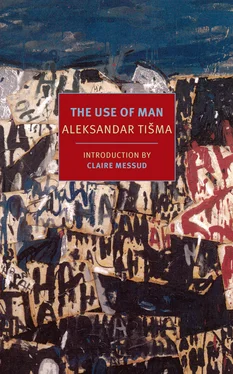Aleksandar Tišma - The Use of Man
Здесь есть возможность читать онлайн «Aleksandar Tišma - The Use of Man» весь текст электронной книги совершенно бесплатно (целиком полную версию без сокращений). В некоторых случаях можно слушать аудио, скачать через торрент в формате fb2 и присутствует краткое содержание. Год выпуска: 2014, Издательство: NYRB Classics, Жанр: Современная проза, на английском языке. Описание произведения, (предисловие) а так же отзывы посетителей доступны на портале библиотеки ЛибКат.
- Название:The Use of Man
- Автор:
- Издательство:NYRB Classics
- Жанр:
- Год:2014
- ISBN:нет данных
- Рейтинг книги:5 / 5. Голосов: 1
-
Избранное:Добавить в избранное
- Отзывы:
-
Ваша оценка:
- 100
- 1
- 2
- 3
- 4
- 5
The Use of Man: краткое содержание, описание и аннотация
Предлагаем к чтению аннотацию, описание, краткое содержание или предисловие (зависит от того, что написал сам автор книги «The Use of Man»). Если вы не нашли необходимую информацию о книге — напишите в комментариях, мы постараемся отыскать её.
A work of stark poetry and illimitable sadness,
is one of the great books of the 20th century.
The Use of Man — читать онлайн бесплатно полную книгу (весь текст) целиком
Ниже представлен текст книги, разбитый по страницам. Система сохранения места последней прочитанной страницы, позволяет с удобством читать онлайн бесплатно книгу «The Use of Man», без необходимости каждый раз заново искать на чём Вы остановились. Поставьте закладку, и сможете в любой момент перейти на страницу, на которой закончили чтение.
Интервал:
Закладка:
“Very well,” he agreed, his throat tight with lust. “Let’s go, and then I’ll decide.”
She was rooted to the spot, as if unable to believe that her crime had been so easily pardoned. Then, afraid that he might change his mind, she ran quickly into the darkness. He followed, stumbling over the cobblestones, his legs weak. She took him into a big old house, up a creaking narrow wooden staircase to the top floor, to a door on which hung a rusty padlock. Her hands shook so much, it took her forever to unlock it. Once inside, she fell on her knees before Sredoje. He dragged her to the bed, which showed white in the faint light from the street, a lifeless doll with which he could do absolutely anything.
He played the same trick on other women on the streets around the station. He practiced, perfected the details. At the start he would try to establish how independent or intelligent they were, how experienced in their trade, and how advanced the self-destruction that accompanied it, so that his attack, delayed until the moment they were alone, would be neither more brutal nor more considerate than necessary: to destroy the woman’s confidence while leaving her with enough hope to beg and obey. He trembled as much as his victim, trembled on the brink of achievement and in the fear that one of them would see through his deception. He felt himself sinking into this new addiction as into madness, felt it changing him, making him incapable of any other approach to a woman. After each one of his intoxicating bouts he swore that he would never do it again, telling himself that it was dangerous, that he had had enough experiences to last him a lifetime, that it was time to put them behind him, to keep them as no more than an incredible memory. But the temptation was too powerful. Sitting in the office or lying around at home, he would suddenly recall a posture of supplicating submission, or, better still, think of some form of violation he had missed, but which he could do the next time, and he would get up, his blood hot and his knees wobbly, to rush off to the streets where the women assembled.
He had the gnawing suspicion that he was being seen too often around the station, that the women had exchanged information about the rapist with the police card, or that they had already reported him to the police. A noose, he felt, had been thrown around him and was being tightened. Even so, he could not stop himself; he realized with horror that only a disaster could stop him. That was in fact what happened.
One evening, he came upon a young girl with an unusually firm body. After the deception with the card had worked and he had undressed her and enjoyed her in an attic near the quay, he discovered that her dark-pink body, so supple and strong, still tempted him, and he regretted that his threats ruled out the possibility of their meeting again. Thinking feverishly as they were getting dressed, he asked for her identity card. She dug it out of her dress pocket and handed it to him with a worried look. “I’ll keep this,” he said. “If you want it back, come tomorrow to the place we met today, at the same time.” At home he examined the card; although the photograph did not live up to the girl’s freshness, it was a pleasant reminder and made him want to see her the next day. But that, he knew, would be a mistake, it would be crossing the line of risk, which so far he had not crossed. He should throw the identity card away and not go. But he went.
The girl was where he had told her to be, in front of a pastry window, but as he approached her, a small man in a worn suit and crumpled hat suddenly appeared at her side. An older brother? An uncle? Certainly not her father. Raising his worried-looking, pointed nose, the man asked in a thin voice, “And why, sir, did you take this girl’s identity card?” Sredoje went cold, produced the card from his pocket, and gave it to the man, intending to walk away in silent disdain. But a thickset young policeman appeared out of the nearest doorway. “What’s going on here?” Untroubled, the small man answered at once, confirming Sredoje’s suspicion that there was complicity between them: “This man took the girl’s identity card from her.” And he held it up. “Indeed?” drawled the policeman mockingly, turning to Sredoje. “And who are you, sir, to be taking people’s identity cards from them? Can I see your papers?” Sredoje thought quickly. If he took out his own identity card, he would be subjected to further questioning. He decided on the police card. The policeman unfolded it slowly and read it, his eyebrows raised in surprise. He looked hesitantly at Sredoje, at the photograph, examined it again, then folded it and returned it with a salute. Sredoje walked away.
He stopped going to that part of town, but it did not help. He knew he would be called to account. Several days after the incident, Streuber stood in front of his desk and nervously informed him, “I’ve been ordered to tell you not to leave the office during working hours again without my express permission.” And two days later, no less abruptly, “I’ve been ordered to send you to Captain Waldenheim for a talk. At once, please.”
At the German Military Police headquarters, whose grim, steel-helmeted guards he had often watched from a distance, with a shudder of curiosity, he was expected, and the duty officer took him up to the second floor. Waldenheim was alone in a large office, with a pile of papers and books on his desk. There were several bottles and small glasses on a circular table, and around the table, leather armchairs with seats sunken from use and covered with cigarette ash.
“Sit down,” said Waldenheim and sat himself, sinking deep into the chair. They sipped brandy, lit cigarettes. “It’s my job to reprimand you,” said the captain, clicking his tongue as he put down his glass. “Of course I have no intention of doing anything of the sort. But if you are asked what we talked about, say that you were roasted over a slow fire. And now let’s turn to something more sensible.” He asked Sredoje how he was, what his father was doing, and if there were any interesting new items for sale; he listened carefully to Sredoje’s answers and promised to drop in on them soon. “I think you’ve spent enough time in my office for a thorough tongue-lashing. I’d keep you longer, but I have a lot of work to do.” He held out his hand and kept Sredoje’s in his own for a moment. “Even so, don’t let yourself be caught again in any more of your little pranks. If you’re bored, I’ll try to find something else to amuse you when the weather improves.”
And indeed, he soon began to invite him — through Streuber, Sredoje’s immediate superior — to accompany him on his official trips, as an interpreter. They went to small towns in the interior of Serbia, to Topola, Smederevo, Milanovac, Niš, where Waldenheim had things to do in each local Military Police section. They usually set off in midmorning — Waldenheim liked to sleep late— in a small gray Opel, which first picked up Sredoje on Dobrnjac Street; it returned the same day, in the evening, early or late, depending on the distance and the amount of work Waldenheim had to do. They were always driven by Hans, a young, blond soldier with a long face and thin arched eyebrows, taciturn and extremely attached to Waldenheim. The captain had Sredoje sit in the front next to Hans, while he sat on the back seat, as though on a couch, smoking, chatting, or dozing.
These outings, which continued through the spring and summer of 1943, were extremely pleasant for Sredoje. They took him away from the oppressive heat of Belgrade, from the dusty office, which, since he had been forbidden to leave it, he felt was a place of punishment. A few deft movements of Hans’s hands on the steering wheel, and they would be out on the main road, where Sredoje was overwhelmed by new images — vegetation, villages, people. The wind blew the freshness in through the open windows; Hans drove, stepping on the accelerator with silent precision; Waldenheim chattered away, often teasing Hans about his fast driving and his reticence, sometimes tickling his bare, sunburned neck or jokingly tugging at his ear, and the trip would pass quickly, in exhilarating motion. They would stop in the middle of a town, and Waldenheim would put on his jacket and get out of the car, usually specifying the time he was to be picked up. For a few hours Sredoje and Hans would sit in front of a small tavern in the shade of vines and drink beer, Hans, silent, knitting his brows, Sredoje watching the peasants, the children, who cast mistrustful looks at the two of them. If they had more time, as soon as they dropped Waldenheim off, they would drive to the nearest river and, taking off their clothes, go for a swim, then sunbathe on the stones. At the appointed hour, refreshed and replete with silence, they would drive back to the police post and wait for Waldenheim. Then they would race back to Belgrade.
Читать дальшеИнтервал:
Закладка:
Похожие книги на «The Use of Man»
Представляем Вашему вниманию похожие книги на «The Use of Man» списком для выбора. Мы отобрали схожую по названию и смыслу литературу в надежде предоставить читателям больше вариантов отыскать новые, интересные, ещё непрочитанные произведения.
Обсуждение, отзывы о книге «The Use of Man» и просто собственные мнения читателей. Оставьте ваши комментарии, напишите, что Вы думаете о произведении, его смысле или главных героях. Укажите что конкретно понравилось, а что нет, и почему Вы так считаете.












